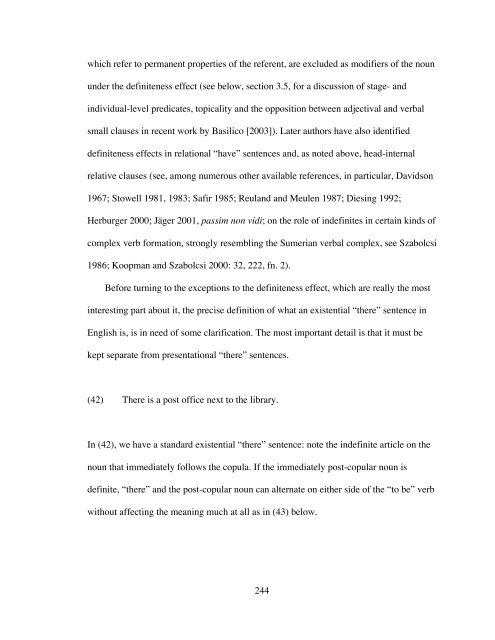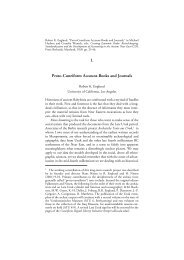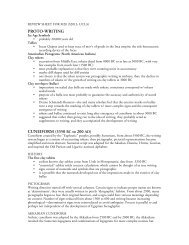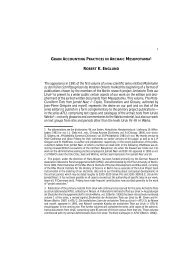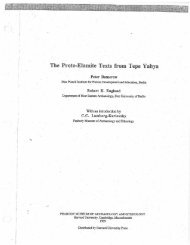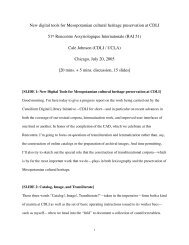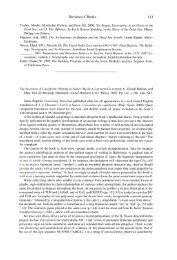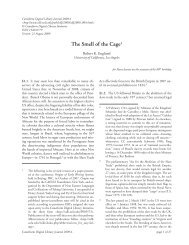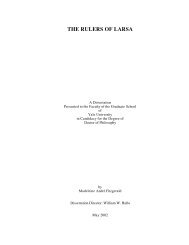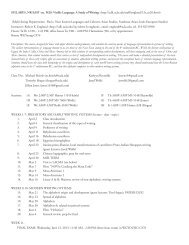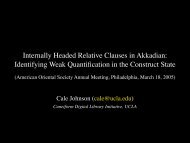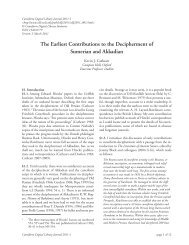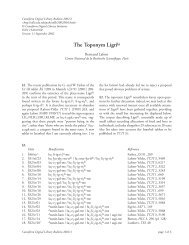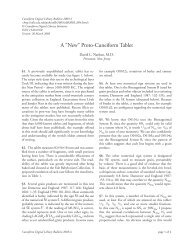- Page 1 and 2:
UNIVERSITY OF CALIFORNIA Los Angele
- Page 3 and 4:
To Grace iii
- Page 5 and 6:
Section 2.3: BNBV inal reduplicatio
- Page 7 and 8:
ACKNOWLEDGEMENTS Each dance and its
- Page 9 and 10:
education in anthropological lingui
- Page 11 and 12:
adopted me, taught me Japanese, fed
- Page 13 and 14:
forthcoming book. Both provided me
- Page 15 and 16:
PUBLICATIONS AND PRESENTATIONS John
- Page 17 and 18:
topic and focus. This dissertation
- Page 19 and 20:
FocusP Focus Phrase ForceP (Illocut
- Page 21 and 22:
Preface Before turning to the first
- Page 23 and 24:
1994), has produced a degree of com
- Page 25 and 26:
grammatical phenomenon begins with
- Page 27 and 28:
morphological oppositions that are
- Page 29 and 30:
The topic-marked noun in (1), Mary,
- Page 31 and 32:
descriptive characterizations appli
- Page 33 and 34:
espects and differ only with respec
- Page 35 and 36:
ergative case-marked lexical noun p
- Page 37 and 38:
focus, clause-linkage and rhetorica
- Page 39 and 40:
1 The BNBV inal distributional clas
- Page 41 and 42:
transitivity as opposed to the patt
- Page 43 and 44:
1.1 Directive case and the oblique
- Page 45 and 46:
(3) Ean. 11 2:9-3:4 (Jagersma forth
- Page 47 and 48:
(6) Ean. 1 9:2-3 (Zólyomi 1999: 21
- Page 49 and 50:
interpreting [ni] 10 as locative, w
- Page 51 and 52:
BNBV class will be proposed, but in
- Page 53 and 54:
Examples (8) and (9) obviously diff
- Page 55 and 56:
all identical in syntax), XP 1 refe
- Page 57 and 58:
the two criteria mentioned above, n
- Page 59 and 60:
Note that two lexemes, saœ-√il 2
- Page 61 and 62:
this chapter. And, it is, after all
- Page 63 and 64:
1.3 BNBV inal as a low source appli
- Page 65 and 66:
in the English double object constr
- Page 67 and 68:
Various theoretical considerations
- Page 69 and 70:
But Landau then draws a comparison
- Page 71 and 72:
work of Nichols who describes the d
- Page 73 and 74:
1.4 BNBV inal verbs of perception B
- Page 75 and 76:
(31) Eduba Regulations [PBS 1/2, 98
- Page 77 and 78:
The special characteristic of BNBV
- Page 79 and 80:
9. 1/3(diß) ma.na 5(diß) gin 2 in
- Page 81 and 82:
(40) Inanna and Ebih [1.3.2], ll. 8
- Page 83 and 84:
(44) Sumerian Proverbs, Collection
- Page 85 and 86:
465. d nergal d meß 3.lam.ta.e 3.[
- Page 87 and 88:
15. [x x] ki niœ 2 zi pa.an.pa.ne.
- Page 89 and 90:
23. d en.lil 2.le igi.ni ki kur 2.r
- Page 91 and 92:
argument to be changed to locative
- Page 93 and 94:
(60) A praise poem of Shulgi (Shulg
- Page 95 and 96:
199. uruda ˙a.zi.in 2(diß) ma.na
- Page 97 and 98:
1.7 Possible motivations for the BN
- Page 99 and 100:
Note that I differ from Zólyomi in
- Page 101 and 102:
Gragg’s statistics, based on a co
- Page 103 and 104:
1.8 Ergative possessors and the tra
- Page 105 and 106:
sentences in which they occur, but
- Page 107 and 108:
In the examples in (72), a dummy pr
- Page 109 and 110:
2 Decomposing lexical aspect: Telic
- Page 111 and 112:
aspect” as a rough equivalent to
- Page 113 and 114:
esultative secondary predicates—i
- Page 115 and 116:
In (1), factoring out tense as much
- Page 117 and 118:
separately on the basis of whether
- Page 119 and 120:
In the three examples in (2), contr
- Page 121 and 122:
nominal modified by the secondary p
- Page 123 and 124:
translated by Akkadian D-stem verbs
- Page 125 and 126:
forms are, in some cases at least,
- Page 127 and 128:
(Yoshikawa 1993, 308). Whereas D-st
- Page 129 and 130:
coffee—only the inanimacy of coff
- Page 131 and 132:
(16) wo3 wen4 (yi) wen4 zai4 jue2-d
- Page 133 and 134:
(19) ta1 de lian3 hen3 bai2 she Pos
- Page 135 and 136:
eduplicated stem is followed by the
- Page 137 and 138:
2.3 BNBV inal reduplication: Depict
- Page 139 and 140:
16. dum.dum.bi lugal d ur. d za.ba
- Page 141 and 142:
352. œiß bal ki.ßar 2.ra mu.ni.i
- Page 143 and 144:
check on quality or quantity of fie
- Page 145 and 146:
accomplishment, so as secondary pre
- Page 147 and 148:
earing the *bi-√ prefix generally
- Page 149 and 150:
denoting progress also occurs in su
- Page 151 and 152:
verbs are also injunctive forms, an
- Page 153 and 154:
(42) The Exploits of Ninurta [1.6.2
- Page 155 and 156:
The example in (44) was presented i
- Page 157 and 158:
The last area of lexical aspectual
- Page 159 and 160:
As an example of the restriction on
- Page 161 and 162:
followed by *-e (which could be an
- Page 163 and 164:
(50) [ Topic saœ.ki.ni [ Appositio
- Page 165 and 166:
26. d en.ki me a.na œal 2.la mu.u
- Page 167 and 168:
167. peß 2 tur.≠gin 7± kiri 3
- Page 169 and 170:
context available in these three pa
- Page 171 and 172:
less clear. Achievements are quite
- Page 173 and 174:
(61) A hymn to Haya for Rim-Sin (Ri
- Page 175 and 176:
2.5 Introducing telicity, ßu, and
- Page 177 and 178:
followed by resultative seems to be
- Page 179 and 180:
In (67), I present the two-part der
- Page 181 and 182:
internal relative clauses such as t
- Page 183 and 184:
gave the floor a clean sweep” onl
- Page 185 and 186:
248. [za].e tuß.a er 2 œa 2.e ga.
- Page 187 and 188:
Since it is an achievement predicat
- Page 189 and 190:
10. siki.ni u2 numun 2.bur.gin 7 i
- Page 191 and 192:
(81) Enmerkar and Ensu˙girana [1.8
- Page 193 and 194:
2.6 BNBV inal as a particle-verb co
- Page 195 and 196:
than indicating the location or adv
- Page 197 and 198:
(90) Hey, toss [ Indirect object me
- Page 199 and 200:
object position if the applicative
- Page 201 and 202:
(98) Indonesian causative in -kan (
- Page 203 and 204:
constituents, which happens to corr
- Page 205 and 206:
2.7 The link between the BNBV const
- Page 207 and 208:
(103) a. BI (du 8, igi, gig) b. gu
- Page 209 and 210: 3 Diagnosing presupposition in Sume
- Page 211 and 212: contrastive focus construction with
- Page 213 and 214: 3.1 Presupposition and assertion, t
- Page 215 and 216: The easiest way of differentiating
- Page 217 and 218: In the case of an existential sente
- Page 219 and 220: verbs of direct perception in Sumer
- Page 221 and 222: demonstrative reference, whereas th
- Page 223 and 224: 3.2 Focus and focal presupposition
- Page 225 and 226: In both (15a) and (15b), the focuse
- Page 227 and 228: sentence (taking into consideration
- Page 229 and 230: similar structures in other languag
- Page 231 and 232: of *mini-√ < *bi-ni-√, the situ
- Page 233 and 234: emphasize that in all likelihood th
- Page 235 and 236: line 207: instead of igi mi.ni.in.i
- Page 237 and 238: 349. i 3.gur 2 ki.a mu.na.ab.za He
- Page 239 and 240: 182. niœ 2. ak.a “What my evil m
- Page 241 and 242: The curious word-order in line 146
- Page 243 and 244: 105. e 2 nam.ti.la e 2 d en.lil 2.l
- Page 245 and 246: (29) Lugalbanda I [1.8.2.1], l. 409
- Page 247 and 248: similar to the previous examples of
- Page 249 and 250: (33) Textual witnesses to Dumuzi’
- Page 251 and 252: 55. su 8.ba.ra ki d œeßtin.an.na.
- Page 253 and 254: Shlonsky 2004). If one were to tran
- Page 255 and 256: Although the omission of the nomina
- Page 257 and 258: (38) a. Enmerkar and the Lord of Ar
- Page 259: If we are to pick apart the subtle
- Page 263 and 264: Definite noun phrases such as “my
- Page 265 and 266: . kamree-mee aadmii hai room-in man
- Page 267 and 268: . larkee-kee paas kuttaa hai boy.Ob
- Page 269 and 270: topicalized, the following example
- Page 271 and 272: . when there is more than one gover
- Page 273 and 274: The contrast in (53), therefore, is
- Page 275 and 276: (55) John-un [[totwuk-i tomangka]-n
- Page 277 and 278: These distinctions can also provide
- Page 279 and 280: ather THE BIRD that did so” count
- Page 281 and 282: epeating the presupposition of the
- Page 283 and 284: (5) Gilgamesh and the Netherworld,
- Page 285 and 286: 4.2 Focus-affected *bi-√ prefix c
- Page 287 and 288: In the first of my examples of focu
- Page 289 and 290: indicate that Enmerkar seeks neithe
- Page 291 and 292: 62. d en.lil 2 d nin.lil 2.da tuß.
- Page 293 and 294: 117. ki lugal gub ki dadag.ga nam I
- Page 295 and 296: Alster (1974, 34-35) reconstructs l
- Page 297 and 298: 245. d ezina 2.ra You should not ..
- Page 299 and 300: ki 34. lu2 ma2.ri2 .ke4 œalga ur.r
- Page 301 and 302: (22) The Young Scribe and his Fathe
- Page 303 and 304: 4.3 Focus-affected compound verb co
- Page 305 and 306: 11. na ri.ga.œu 10 ßu nam bi 2.ba
- Page 307 and 308: following a word that ends in /n/ i
- Page 309 and 310: 408. u 4 ˙ul gig du 11.ga d en.lil
- Page 311 and 312:
and made the subject of a lengthy
- Page 313 and 314:
It is interesting that the construc
- Page 315 and 316:
as “to look at,” which need not
- Page 317 and 318:
(32) María se fué con nada Maria
- Page 319 and 320:
applying to nada as in [32b]) and
- Page 321 and 322:
is negated. The phrase igi nu mu.ni
- Page 323 and 324:
(33a), “Maria didn’t leave with
- Page 325 and 326:
(41) a. ston petro dhanisan to vivl
- Page 327 and 328:
ninda and uzu.zu appear in the same
- Page 329 and 330:
(“Specify” in Chung and Ladusaw
- Page 331 and 332:
5 Possession, animacy and the rise
- Page 333 and 334:
understood as a single component of
- Page 335 and 336:
increasingly specific) models of th
- Page 337 and 338:
diachronic origins (as opposed to t
- Page 339 and 340:
C” ergativity. Whether Type C erg
- Page 341 and 342:
Here in the realm of participial co
- Page 343 and 344:
straightforward: the perception beg
- Page 345 and 346:
instrumentality. In other words, th
- Page 347 and 348:
causative environment described by
- Page 349 and 350:
work on bare nouns, indefiniteness
- Page 351 and 352:
Baker, Mark. 1988. Incorporation: A
- Page 353 and 354:
Cooper, Jerrold, and Wolfgang Heimp
- Page 355 and 356:
Givón, T. 1984. Syntax: A Function
- Page 357 and 358:
Kim, Ji-yung. 2003. Verb Reduplicat
- Page 359 and 360:
Loprieno, Antonio. 1991. Focus, Moo
- Page 361 and 362:
Prince, Ellen. 1992. The ZPG Letter
- Page 363 and 364:
------. 1991. The Alignment of Argu
- Page 365 and 366:
------. 1970. Eine Schicksalsentsch


